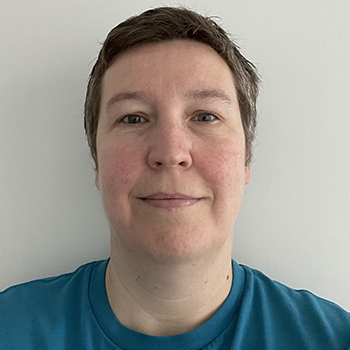Valerie Florentin, a course director in the School of Translation at Glendon Campus, always liked to help people understand things and was interested in teaching “as far back as I can remember.” Today, with a PhD under her belt, she teaches translation and also works as a freelance translator.

“There’s something magic in education and hopefully, you’ll have an impact on people’s lives,” Florentin said. Given her specific interest in assessment and interest in the practice of upgrading, “Innovatus” asked her opinion on the future of teaching and learning.
Q: How has teaching changed since you entered the profession?
Florentin: It has changed so much! Universal design has always been there, but it’s more present today. Institutions grant accommodations more readily and incorporate as many accommodations as they can so everyone benefits. Classrooms are becoming more diverse and there is more availability of testing for various diagnoses. I have ADHD (attention deficit/hyperactivity disorder), and today, I wouldn’t just be an annoying kid in the class; a lot of disorders are validly discussed and recognized. Add gender to the mix, too, as more and more young adults decide who they are and an openness in teaching becomes more and more important.
Q: Is technology driving the changes that you see?
Florentin: Society drives change. Technology modifies what we can do and how fast, but the changes were coming anyway. Technology is just along for the ride. For example, distance learning has been available for a long time, but technology made it easier.
Q: How do we balance our need for connection with our need for flexibility?
Florentin: We do this by being compassionate, by talking to people as people and addressing their needs. We need to see students as individuals and consider each student as a person, not the class as a group.
Q: How will internationalization change education, especially with the prevalence of globally networked learning? Broaden it?
Florentin: Toronto is already a multicultural city, but elsewhere, it will broaden education. Internationalization changes a number of things. For instance, you can’t take for granted that your students had a Canadian education and understand North American references. We rely a lot on what we assume are common references.
Internationalization is a plus, but it’s not new. In the past, it meant going abroad and you had to travel. Technology helps; you have globally networked learning in courses. Those contacts are available and easier to make and that’s great. And, if you’re internationally inclined, you can learn about other cultures here in Toronto.
Q: Where does experiential education fit into the picture?
Florentin: It has become more important. It’s a great way for students to have a glimpse of their future reality and to bridge the gap between studies and work. It’s also a great way for universities to become more a part of the community and give back. It’s a win for everyone. Companies get a glimpse of their future workforce; students get experience; and universities become more in touch and part of the community.
Q: Do students want more agency? Will they direct their own learning more?
Florentin: Yes, they want flexibility and options. Historically, students attended university because their parents did and expected their children to follow suit. The new generation is there because they want to be. They have ideas about what university should be and what they expect from their studies. They are investing their money and they want to make sure they get their dollars’ worth. Now, they go to university because they have an idea about what they want to do. They may have started, stopped and changed direction or found a course that interested them more and switched programs. They are not there to sit in class because they have to; they have an idea of what they want to gain.
Q: When it comes to assessment, what matters?
Florentin: Fairness! Accommodations are needed because not everyone has the same level of aptitude and some have learning disabilities and exceptionalities. We’re also dealing with young adults and it’s not that easy: they’ve been through pandemic changes and social changes. They have lots of questions about their futures and have to decide what type of person they want to be. Add in the stress of exams, too.
We must take all of that into account. Should we really be using normal distribution curves? Shouldn’t it be, “Can you do this, or can’t you?” Can we have a gradeless university? Can we assess without grading, without the ideal answer and without insisting on essays? There are a number of ways students can prove they are learning without our usual approaches. Are we measuring the ability to handle stress or are we evaluating learning? Also, having no grades decreases anxiety. You don’t always need a grade to ensure that a student knows what they need to know.
Q: Where do you see things heading?
Florentin: Education will become more inclusive and more accessible, and you’ll see lots of first-generation university students. It will be more democratic; education is a great equalizer. I hope universities become more open to the outside world and build bridges, such as with experiential education; I’d like to see more of that.
Q: Describe a class in 2040.
Florentin: Half of the students will be in the classroom and half will be online, like a hyflex model. I hope it will be more and more international, including collaboration between universities so we can capitalize on each other’s knowledge. There will be a fair system of grading, taking into account exceptionalities, progress and effort, and perhaps there will be open courses where the community is welcome. We may even see those held in library settings or parks so they are less daunting.


